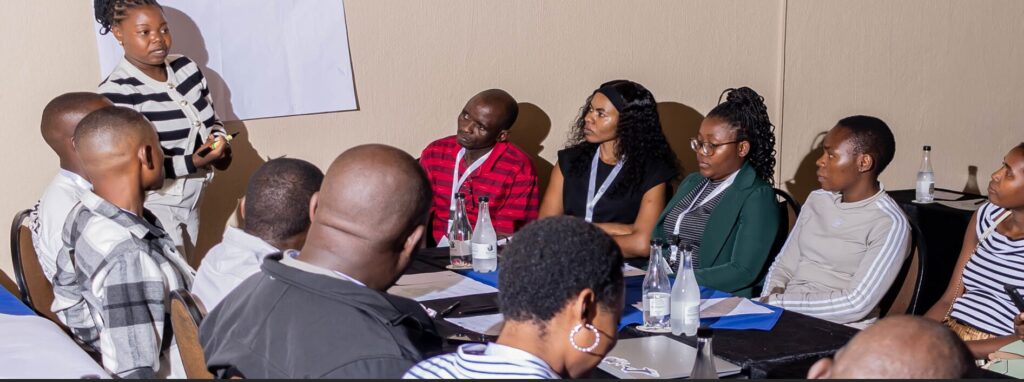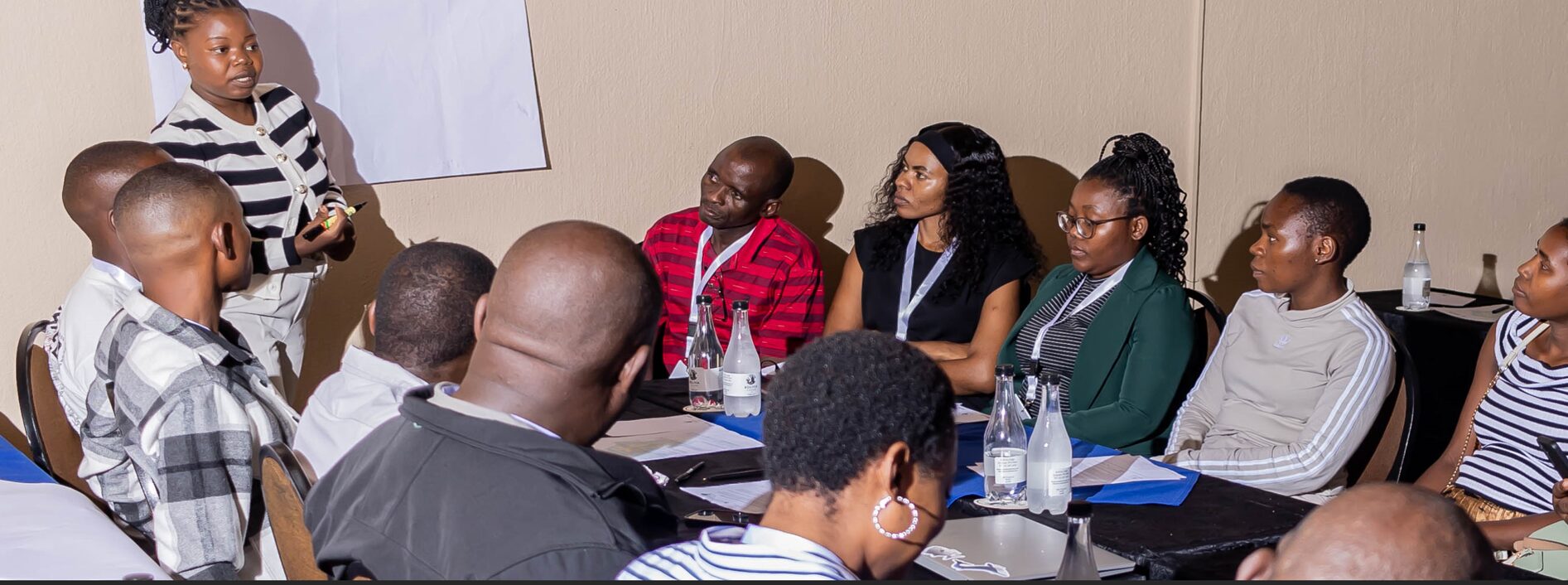Influencing Climate Policies Through Research: Insights from the PALM-TREEs Project
/
Co-authors: Edith Abilogo & Ellen Dyer
Climate change poses significant challenges worldwide, particularly for vulnerable communities that bear the brunt of its effects. The PALM-TREEs project focuses on Central Africa and Nigeria, seeking to identify and propose researcher and community-based solutions through transdisciplinary research. This blog explores key findings from various case studies across the project, emphasizing the impacts of climate extremes on marginalized communities, including insights from the White Volta Basin, the Democratic Republic of the Congo (DRC), and Douala, Cameroon, while highlighting the importance of using research to influence effective climate policies. Importantly, gender considerations are integrated throughout the analysis, recognizing the unique vulnerabilities faced by women and other marginalized groups.

Effective climate policy must consider the voices of those most affected. Recent workshops in Lagos, Accra, Bolgatanga, Douala, Kitui, Ilorin, Lagos, Tamale and Turkana, have gathered insights from diverse stakeholders, including community leaders, government officials, and researchers. These discussions reveal a common thread: marginalized communities—such as informal settlers, women, the elderly, and indigenous populations—face unique challenges that current policies often overlook. Women, for instance, frequently have less access to resources and decision-making processes, exacerbating their vulnerability to climate impacts.Key Findings from the Case Studies
Lagos Workshop Insights
In Lagos, Nigeria, a workshop brought together 22 stakeholders who overwhelmingly acknowledged that climate variability and extreme events are significant challenges in their regions. While 63.6% of participants reported some level of community involvement in policy formulation, nearly half of the existing climate policies failed to effect noticeable change. This gap underscores the need for more inclusive and effective governance, particularly in addressing gender disparities in policy engagement.
Central Africa Responses
Stakeholders from Central Africa, including Cameroon, Congo, Chad, Gabon, DR Congo, Equatorial Guinea, Sao Tomé and Príncipe, and Rwanda echoed similar concerns. In Douala, these stakeholders discussed severe climate-related impacts on agriculture and health, particularly in rural areas where communities depend on subsistence farming. The discussions revealed a significant disconnect between climate policies and the actual needs of these communities, emphasizing the necessity for targeted interventions that consider local realities and gender dynamics.
Accra Insights
In Accra, participants were divided into expert and community groups, revealing differing perspectives on vulnerability. Experts identified specific localities at risk, while community members highlighted social identity groups—such as street vendors and pregnant women—that are particularly vulnerable. Both groups called for better engagement in the creation of climate-related policies, noting that existing frameworks often fail to address the needs of marginalized populations, especially women and children.
Kenya: Kitui and Turkana
In Kitui, stakeholders identified marginalized farmers and the elderly as particularly vulnerable. They acknowledged the existence of relevant policies but emphasized that their implementation and dissemination were lacking. In Turkana, a diverse range of marginalized groups, including pastoralists and refugees, were identified, with participants agreeing that climate policies largely failed to meet their needs. The unique challenges faced by women in these communities, such as limited access to land and resources, were also highlighted.
Insights from the White Volta Basin
The White Volta Basin in Ghana faces significant challenges from increasing floods and droughts, which severely impact marginalized communities and hinder sustainable development. Inception workshops held in Tamale and Bolgatanga gathered various stakeholders, including community members, disaster management professionals, and hydrometeorological experts. Participants shared experiences and traditional knowledge, discussing the impacts of hydrometeorological hazards. A key takeaway from this team was the interconnectedness of climate challenges faced across regions, highlighting that the impacts of climate extremes are not isolated but part of a broader narrative affecting vulnerable communities.
Key findings:
- Vulnerability to Climate Extremes: Many communities, including women, were identified as particularly vulnerable to climate impacts. However, it was highlighted that vulnerability is not static and is variable depending on local conditions and time of year.
- Policy Gaps: Many existing climate policies do not adequately address the needs of marginalized groups, especially concerning gender and social inclusion.
- Community Involvement: There was a consensus that communities and researchers should be more actively involved in climate policy creation, as current engagement levels were deemed insufficient.
- Implementation Challenges: Funding shortages, traditional beliefs, and a lack of education were cited as significant barriers to effective policy implementation.
- Ineffective Communication: Poor strategies prevent communities from accessing crucial climate information, hindering awareness and engagement.
- Cultural Resistance: Traditional beliefs and top-down approaches can create resistance to necessary changes.
Recommendations for Improvement
Based on the analyses of these case studies, several actionable recommendations emerge:
- Enhance Stakeholder Engagement: Actively involve vulnerable communities, especially women and marginalized groups, in the policy-making process to ensure their needs are met. Dr Grace Olukoi, PALM-TREEs Co-Investigator and Gender & Social Inclusion Focal Lead at Leads City University, Nigeria, states: ‘’The Policy Consultation Hour, is part of our strategy to engage stakeholders in PALM-TREEs Nigeria. Participants comes from government, NGOs, communities, and academia to discuss climate issues and policy responses. Through a three-stage approach involving brainstorming, marketplace discussions, and working groups, stakeholders identify key climate-related challenges such as floods and heatwaves. The session highlights the need for improved communication, better institutional capacity, and mainstreaming climate policy while fostering healthy dialogue among diverse participants. This collaborative effort co-creates knowledge and strategies to effectively address climate risks.’’
- Strengthen Communication: Develop localized communication strategies that effectively reach all community members and provide regular updates on policies, with a focus on gender-sensitive messaging. Rachel Yeboah, PALM-TREEs Early career researcher at the University of Energy and Natural Resources, Ghana, declares: ‘’To develop localized communication strategies that effectively reach community members, the Accra team focused on continuous community engagement. They visited local political and traditional authorities to explain the project and its benefits, building trust essential for the installation of I-button sensors.’’
- Build Capacity: Implement training programs to empower local leaders and community members, particularly women, with knowledge about climate issues and policy frameworks. Monique Yigbedek, PALM-TREEs CO-Principal Investigator and Science-Policy Dialogue Expert at Reseau Femmes Africaines pour le Developpement Durable, Central Africa, explains: ‘’Developing connections with local stakeholders, including sector ministries and community projects, is crucial for sharing policy frameworks. A deep understanding of the political landscape is also essential for identifying legal policy instruments used in local capacity-building sessions.’’ Andrew Onwuemele, PALM-TREEs researcher at Nigerian Institute of Social and Economic Research, Nigeria, highlights: ‘’The uptake of research findings by policymakers is often hindered by a lack of collaboration and ineffective translation of research into practical applications. To address these challenges, engaging stakeholders from the outset of research projects has emerged as a vital strategy. Stakeholder engagement not only enhances the relevance and impact of research but also fosters trust and improves outcomes by incorporating diverse perspectives and addressing community needs from the beginning.’’
- Secure Adequate Funding: Pursue diverse funding sources and allocate dedicated budgets for climate initiatives to support implementation. In Kenya, research from the PALM-TREEs project is supporting the development and implementation of a Climate Information System (CIS) by the Turkana County Government and co-organizing a Scientific Advisory Group of research projects. The goal of this system is to provide a more sustainable service that provides more equitable access to climate information and early warning. The CIS is being funded as part of the Financing Locally-Led Climate Action Program and is an opportunity for project research to have a sustainable impact on climate services for local communities.
- Establish Monitoring Mechanisms: Create frameworks for continuous evaluation of climate policies and practices to assess their effectiveness and make necessary adjustments. In PALM-TREEs we are also taking an active approach to monitoring and will be implementing a community based evaluation approach near the end of the project in a number of local case studies. This is an opportunity for communities to feedback on our work but also an opportunity to test tools that might be useful for policymakers and practitioners in their own work.
Looking Ahead
Ultimately, the journey toward sustainable climate action is ongoing and evolving. By embracing innovative approaches and actively engaging with marginalized communities, particularly women, we can build a more resilient future for all. The insights from the PALM-TREEs project, underscore the urgent need for tailored adaptation strategies that enhance community resilience against the impacts of climate extremes. Together, we can work toward a more equitable and sustainable world.
Categories
Countries
CLARE Pillars
CLARE Themes
CLARE Topics
Published
CLARE Projects
CLARE Partners


